Thanks to the world-renowned taste and flavor of this particular breed of chicken, it’s rumored to be dubbed as “the best-tasting and most delicious chicken ever created.” A roasted Bresse Chicken surprisingly often comes at quite a hefty sum – up to hundreds of dollars – in local French markets, indicating how extraordinary these chickens are!
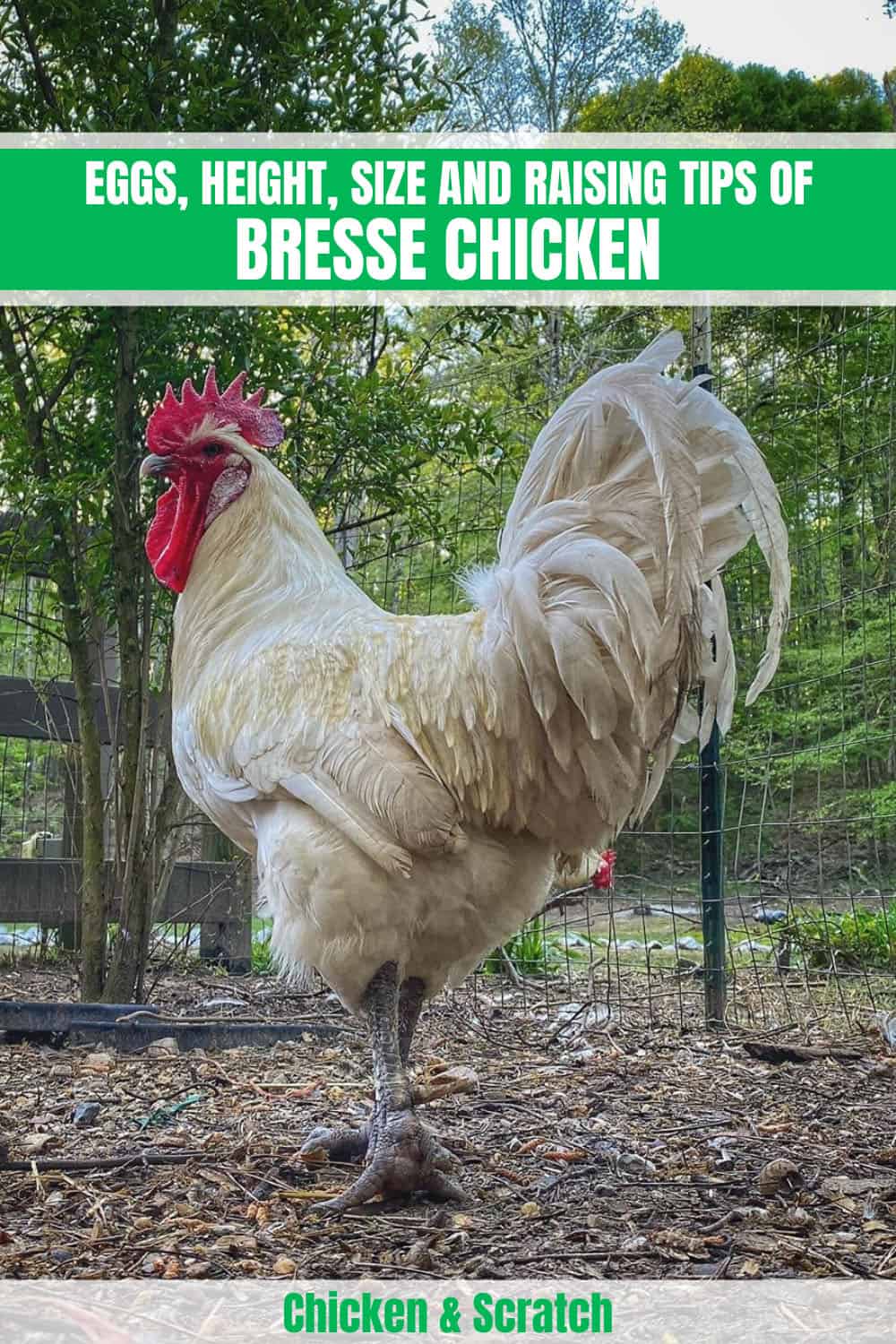
With this article, let’s learn more about this French chicken breed!
Bresse Chicken Overview
| Size | Medium to Large |
| Body Shape | Compact |
| Country of Origin | France |
| Weight | Rooster: 5 to 6.5 pounds (2.3 to 3 kg)
Hen: 6.5 to 8.5 pounds (2.95 to 3.85 kg). |
| Lifespan | 6 to 8 years |
| Temperament | Active and Alert |
| Color | White
Blue Black Gray |
| Rarity | Rare |
| Breed Type | Dual-purpose |
| Best suited for | Free-range Farms |
This special breed comes from eastern France in the Bresse region and is famous for its amazing taste and texture. But to ensure you’re getting the real deal, only chickens that meet strict breeding and raising requirements can be called Poulet de Bresse.
And it’s not just about the flavor; people are also fascinated by how they’re raised, with space to roam freely and find their food. Chefs around the world love using this unique chicken in their dishes because of its incredible quality. No surprise that chefs around the world seek after genuine Bresse meat, renowned for its unmatched flavor, unforgettable texture, and quality guaranteed by France’s Protected Designation of Origin (PDO).
Not only does this exquisite breed offer sublime flavors that bring fine-dining meals to life — their free-roaming habits keep meat so succulent no other contender can come close. Beyond their tastiness, passionate admirers often take trips to explore the region renowned for its diverse landscape and appreciation of traditional poultry breeding practices.
Bresse Background and History
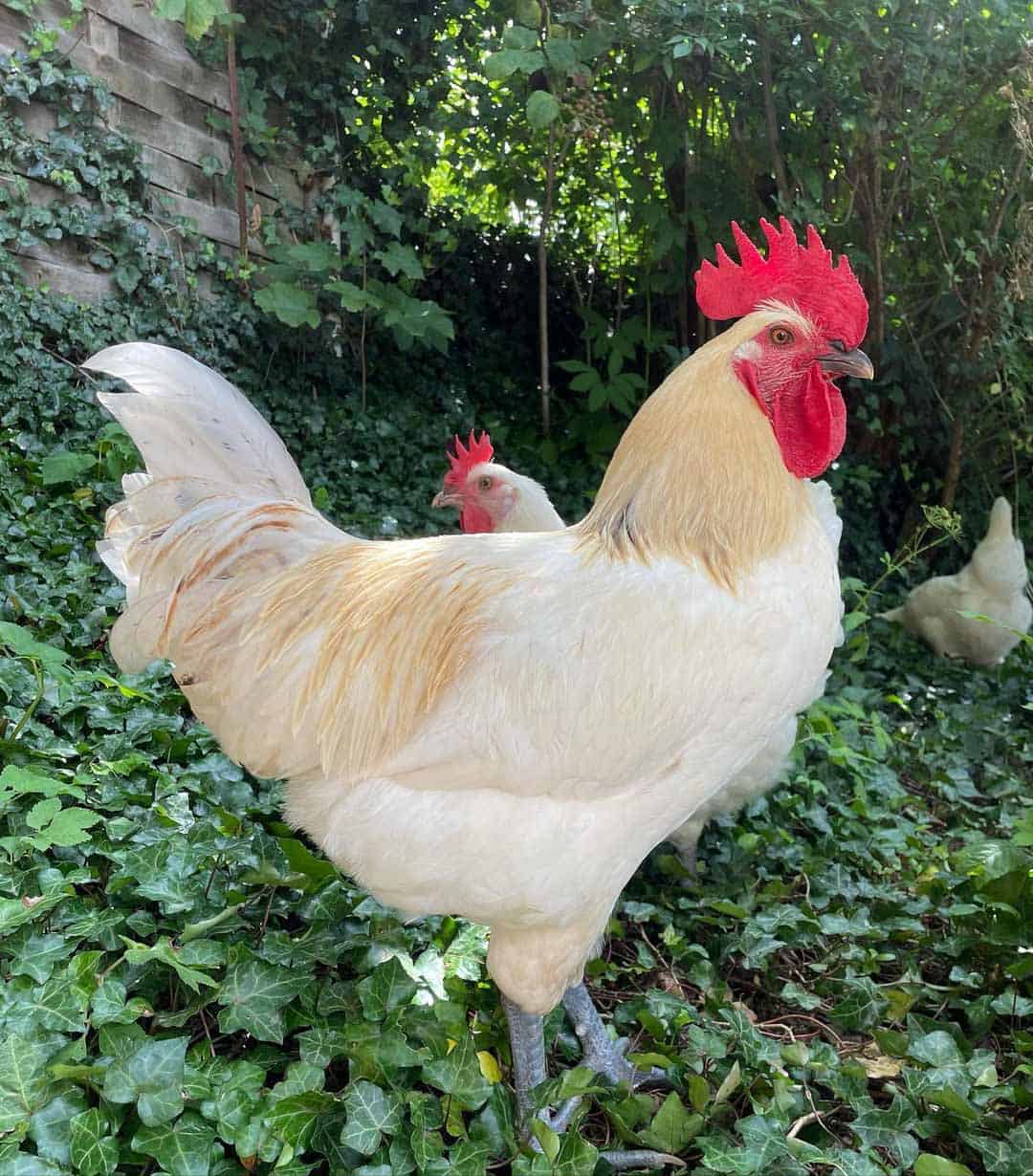
The Bresse chicken originated in Eastern France around 500 years ago in a province called Bresse. This province has since been renamed, but it was near the French Alps and the Rhone River. The area was a large stretch of beautiful woodlands and fields. Writers report the land stretched approximately sixty miles.
Amazingly, the Bresse chicken was formed by a crossbreed of local French fowl. The crossbreeding did not have a specific goal; they were simply mixing the available local fowl.
The Bresse chicken was developed from this crossbreeding. Some say the Bresse chicken was created out of luck. Over time, the fowl that made the Bresse chicken is now forgotten, and we do not know much about them.
In France, the Bresse chicken is known as Poulet de Bresse. It took only a short time for the locals of this region to notice that the Bresse chicken had a distinct taste. It began to earn the reputation of having an exquisite yet unique flavor. This discovery led to more breeding of the Bresse chicken across Eastern France.
We don’t know the names of the local fowl that were used to create the Bresse chicken, but it has been known that they have unique characteristics. The Bresse breed of chickens comes from a genetically recognizably different chicken breed that can distinctly metabolize feed. This metabolism factor is said to contribute to the body form and production of the Bresse chicken.
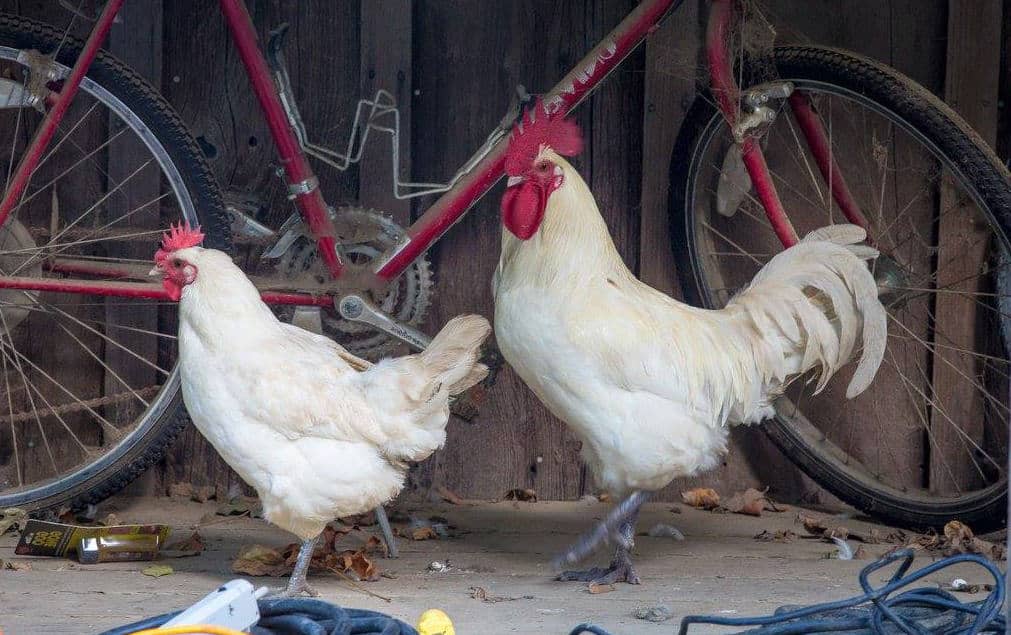
The local fowl had a light muscular frame across their breast, which may be credited for the flavorful taste of the Bresse chicken. Bresse is known for having thin, sleek skin and small light bones throughout its body. These distinct features are said to come from the heritage of the local fowl in Eastern France.
The original creation of the Bresse chicken was astounding to the French; they wanted to maintain the integrity and uniqueness of the bird.
The French continued specific breed selection throughout the years to produce the fantastic Bresse chicken seen today. Unlike other breeds, this breed cannot be crossed with unrelated breeds and maintain the original taste.
Bresse chickens are relatively new to the United States. They were first imported from France to the United States in 2011. Due to certain restrictions, all Bresse chickens imported to the United States must be referred to as the American Bresse.
Breed Standard and Appearance of Bresse Chickens
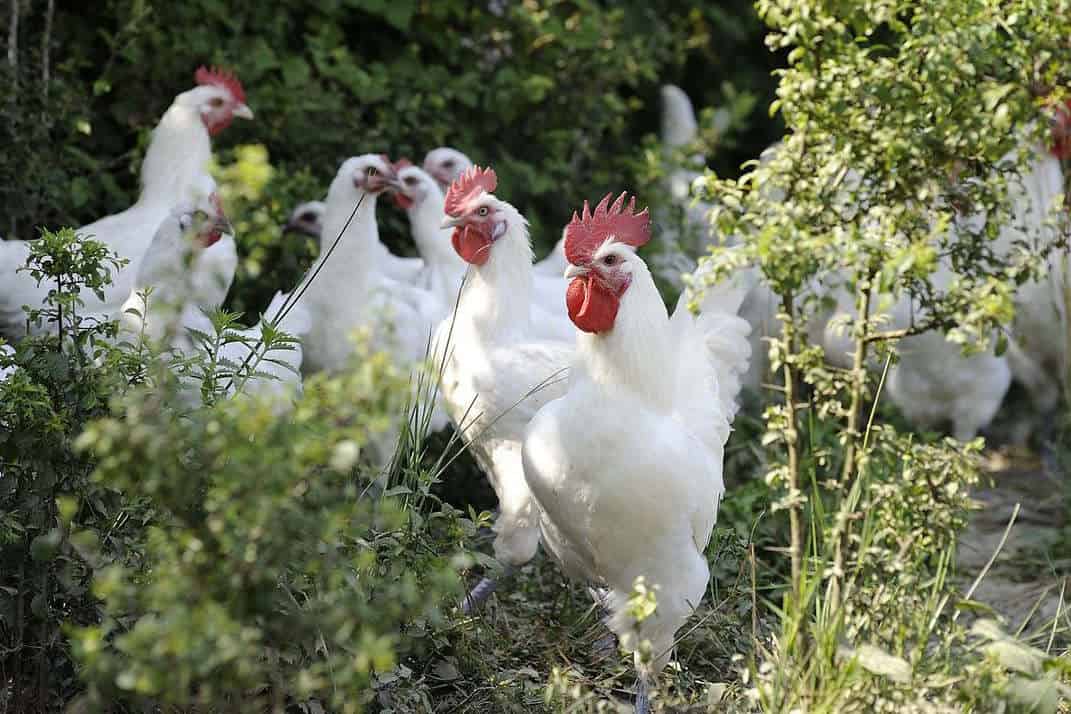
Breed Standard
Bresse chickens are considered rare and are highly sought after, particularly in their home region of Bresse, France. They are also known for their Protected Designation of Origin (PDO) status, which means chickens raised in the Bresse region and meeting specific criteria can be labeled as “Poulet de Bresse,” a prestigious and sought-after designation.
It’s also known as:
- Poularde de Bresse
- Volaille de Bresse
- Chapon de Bresse
- Poulet de Bresse
Only the Bresse de Bény can be considered a Poulet de Bresse. The chickens also need to be raised in the legally identified area in the Bresse region.
It has appellation d’origine contrôlée status and is recognized as such under both EU and UK law. It involves raising the white chickens of a specific breed called “Bresse Gauloise” in the historic region and former province of Bress, which lies in eastern France, to satisfy the regulation standards set by law.
Appearance
The Bresse chicken breed has four varieties. There are white, blue, black, and gray varieties. The most popular and well-known is the white type. The white kind is the most notable because it represents France’s red, white, and blue national flag. The Bresse chicken has the following traits:
- Large bright red comb
- Noticeable bright white feathers
- Their legs have a steel blue tint
All four breeds of the Bresse chicken have a bright red comb and blue steel leg color. The feather color differs by variety. The Bresse chicken is listed under pullet, chicken, or capon types. The class status for the Bresse chicken is significant.
The white Bresse chicken typically weighs about six pounds or more. The other varieties of the Bresse chicken are typically smaller, weighing around 5 pounds. The white Bresse is by far the most wanted and popular.
The Bresse chicken is known to have unusually light bones and very thin skin. This is why the meat of Bresse chickens is considered one of a kind and the tastiest chickens in the world. The Bresse chicken produces succulent meat with an intense flavor.
Personality and Temperament
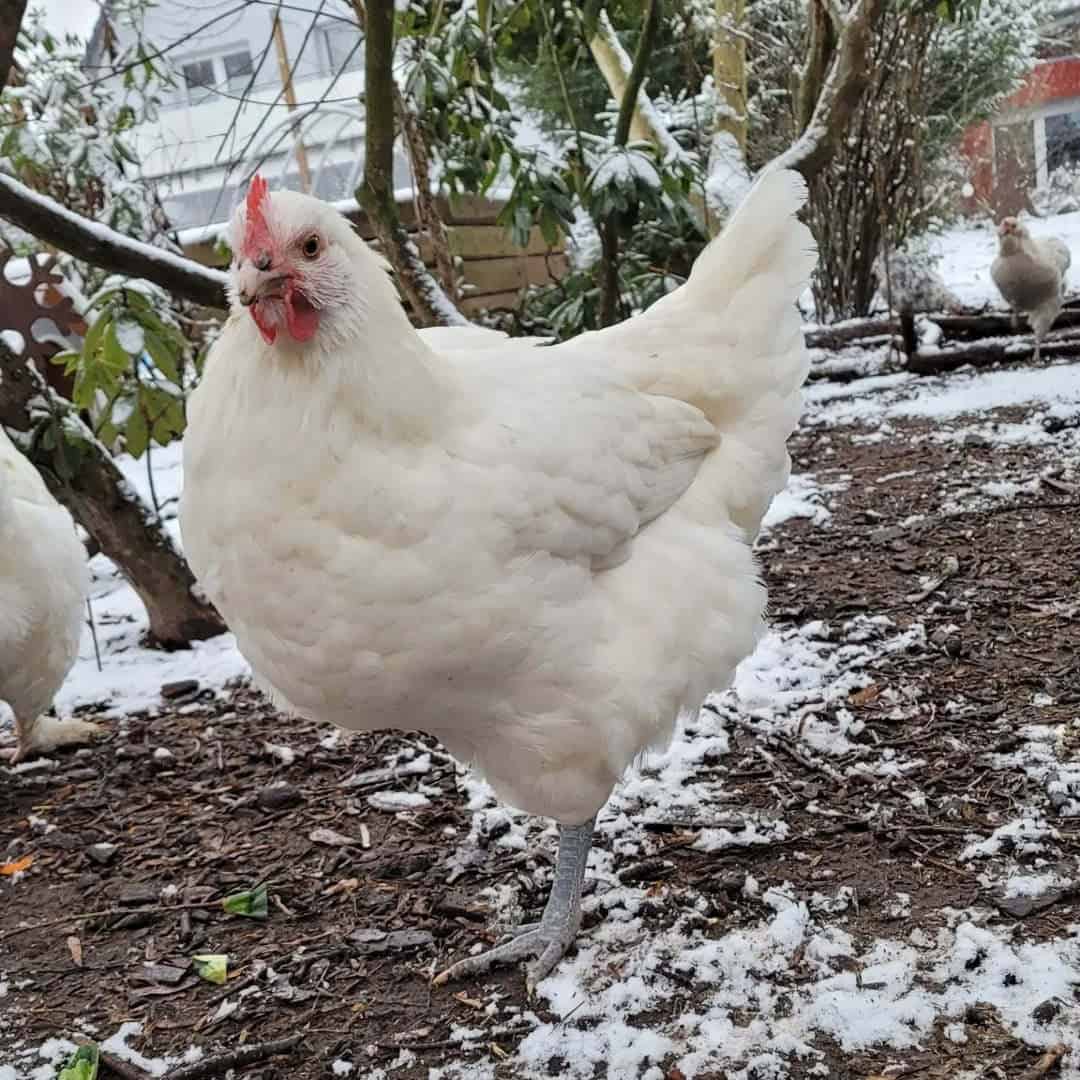
Like other breeds like the Bresse breed, the Bresse chicken can have a nervous personality, meaning they do not do well in closed-in areas. Bresse chickens are extremely social creatures. They are usually seen in large flocks and like to forage together. Other characteristics of their personality include:
- The Bresse bird likes to be handled infrequently. This breed prefers less human interaction.
- They have an even temperament, and this breed shows no aggression.
- It has been noted that the breed is the happiest when it is with other chickens in large open pastures.
- The personalities of the Bresse chicken may be altered if kept in a confined space for more than the recommended amount of time.
Bresse Chicken Egg Laying
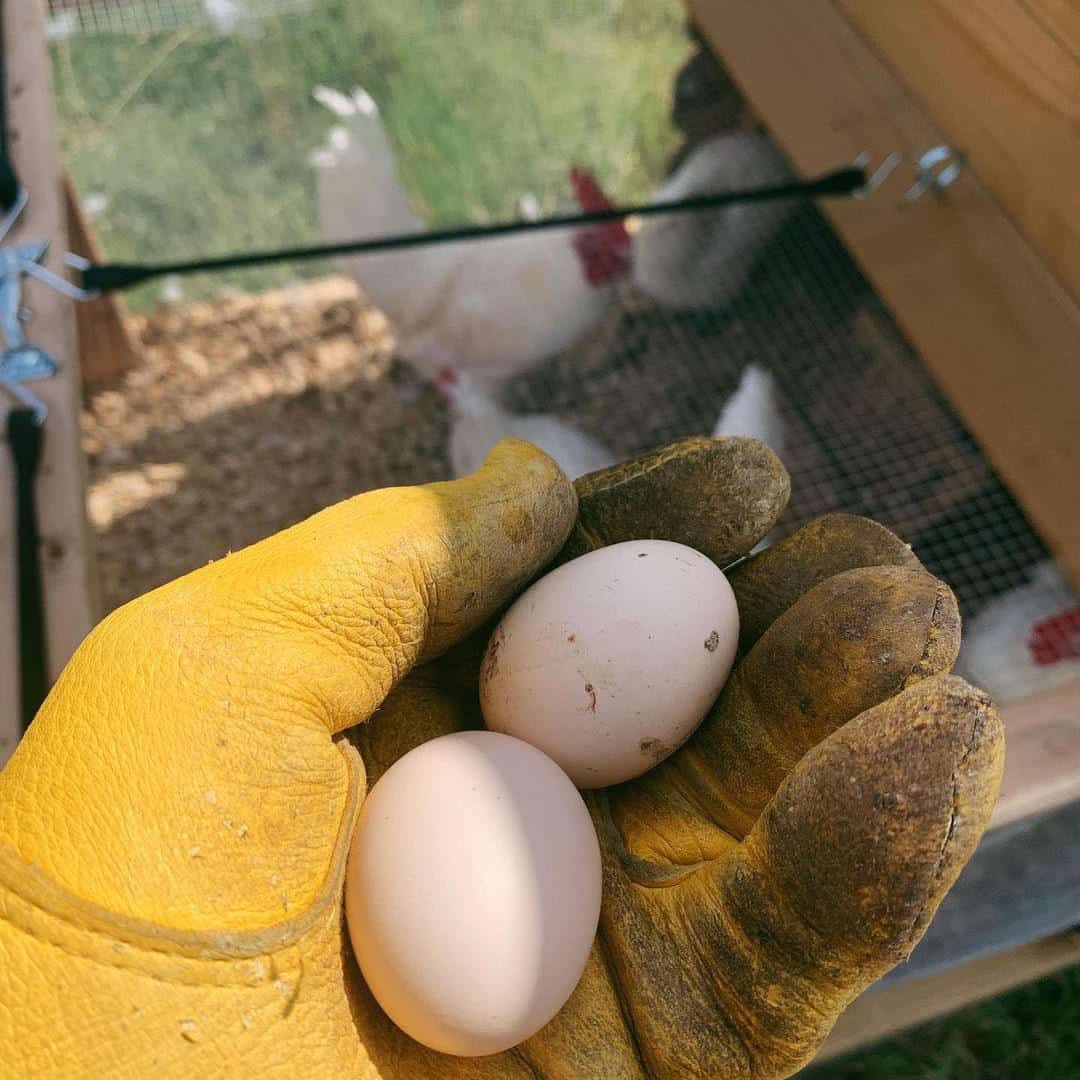
The Bresse chicken is an excellent egg-laying breed. They can usually start laying eggs a month before other egg-laying chickens. One characteristic that sets them apart from other breeds is that they mature early. If the Bresse hen is healthy and well-nourished, she can lay about 250 eggs annually. The eggs produced are cream-colored.
Meat Production
It should be noted that the Bresse chicken is more well-known for its meat than the eggs they produce. The meat of the Bresse chicken has been sought after for centuries.
The flavor of Bresse chicken is said to be far removed from the typical commercial chicken taste. The original French Bresse comes at a hefty price. Some consider it the chicken of royalty because it is more expensive than other breeds.
An official French Bresse chicken is around $50 or higher per chicken. You can only find genuine and original Bresse chicken in the France region. The Bresse chicken is now available in other parts of the world, but they hold a different quality than the genuine Bresse.
An interesting fact is that for a Bresse to be certified as a Bresse chicken, it has to be raised in the Bresse region and eaten locally. This is why the imported breeds cannot just use the name “Bresse Chicken.”
Health Issues and Care
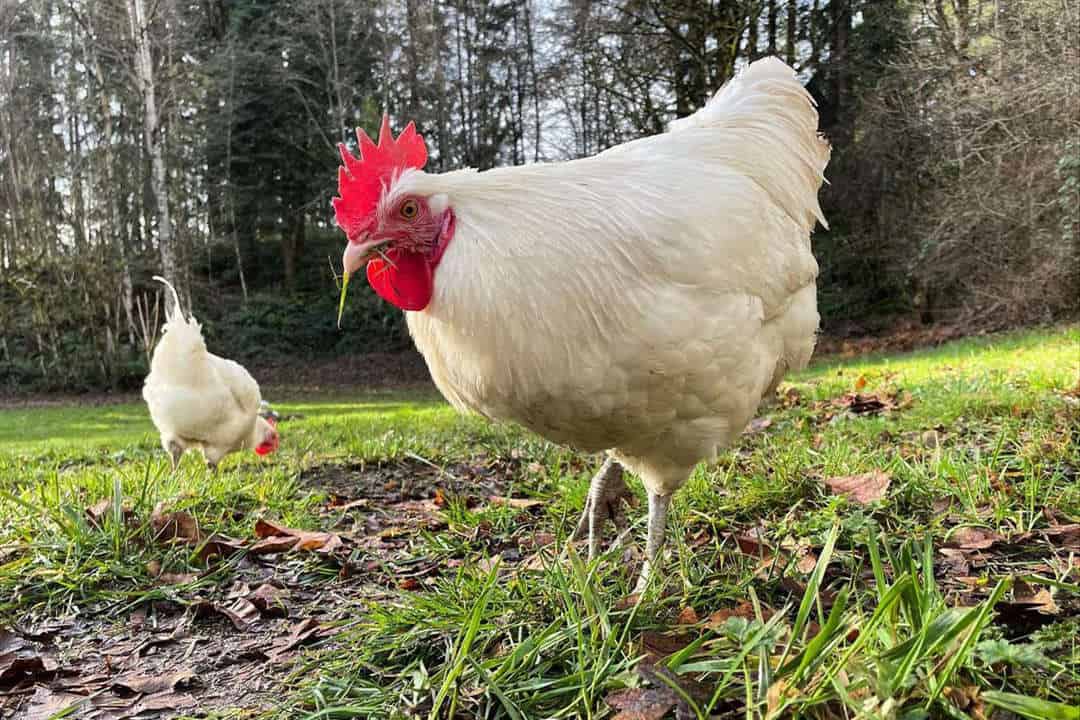
The original Bresse chicken breed has no specific health issues connected only to its species. As the breed is now being imported, it is susceptible to the following health issues:
- Botulism– a disease that can infect chickens by paralyzing their limbs and neck. All breeds of domesticated chicken are in danger of getting this disease. Botulism causes quick death in chickens. There are anti-toxins available to treat botulism.
- Infectious Bronchitis– this disease is common among chickens and can be deadly, wiping out entire flocks. Coughing, sneezing, and snoring are all symptoms of contagious Bronchitis. This disease affects the upper respiratory tract of chickens. When chickens start to experience symptoms of this disease, it is best to separate them and place them in a warm, dry area.
- Infectious Coryza– this is a severe bacterial disease. Infectious Coryza can affect the respiratory system of chickens. The condition will show up as inflammation under the eye. Other symptoms include sneezing and nasal discharge. There is no vaccine to stop this disease. If a chicken contracts this disease, it should be put down so it does not spread to the rest of the flock.
Above are common diseases that can be found in all chicken breeds. Now that the Bresse chicken is being imported to other parts of the world, precautions should be taken to ensure the breed’s health. New locations and new regions bring new diseases and conditions. The care for a Bresse chicken should be kept at a high standard.
7 Tips for Raising Bresse Chickens
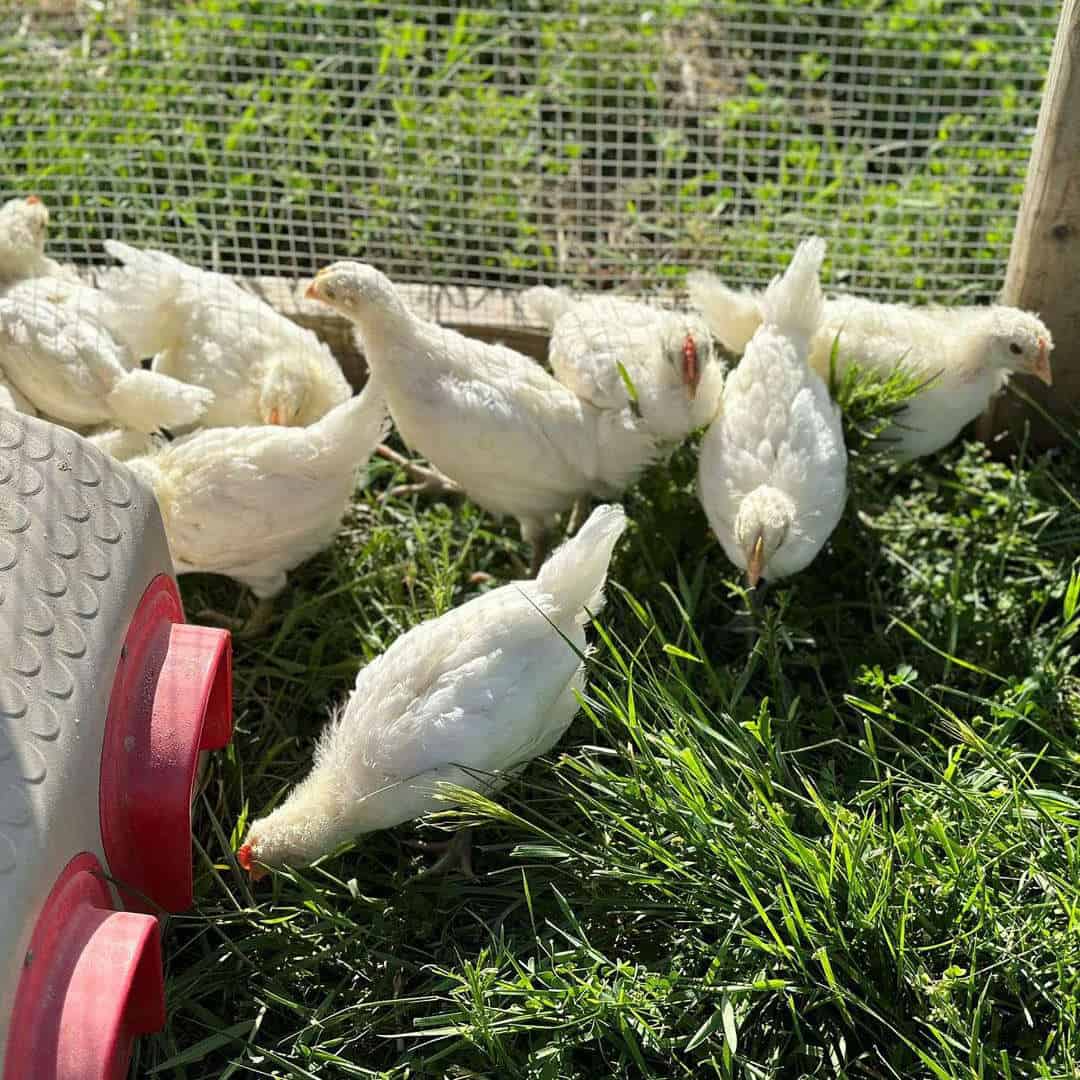
- As chicks, keep Bresse chickens on a daily diet.
- Bresse likes to have open space and pasture to roam. Allow Bresse chicken to roam freely.
- As a Breese chicken grows, limit the amount of corn feed.
- After the chick phase, you should force the Bresse chicken to forage for themselves to find protein sources. It’s said to help with the overall taste of the chicken.
- Once Bresse chickens are moved to pasture, let them forage and then return them to live their last days on a corn and dairy diet.
- Around the 3-4 month mark, confine Bresse chickens in a small confined area to complete development.
- When providing feed to Bresse chickens, ensure that the feed is of high quality; otherwise, you will endanger the quality of the meat.
Summary
The Bresse chicken is a world-renowned breed of chicken. Since its early days in the Bresse region in Eastern France, the Bresse chicken has always had a high-quality reputation. In its 500 years, this breed has been the best-tasting chicken ever.

Joseph Hudson has been raising chickens for over 15 years. In 2018, he completed the Agriculture & Natural Resources program at Mt. San Antonio College. He currently raises over 1400 chickens on his 7.5-hectare farm. He keeps sharing his experience on raising healthy and happy chickens on Chicken Scratch The Foundry.







I am interested in starting breeding/tasing Bresse chicken m Botswana, where can I buy the stock?
Hi!
As chicks, keep Bresse chickens on a daily diet…
Do you mean dairy? if so, what kind of milk? Cow, Goat? Whole, skim, low fat?
Was there ever a response to this question?
from day 35 they are on dairy and and cereals intentional for a low protein diet to encurage foraging for natural protein in insects which is important for the flavor. 2 weeks before slaugter they are confined from the pasture and fattened with corn and milk. so to answer your question any milk that is high in fat.
I am flattered that you used some of the pictures of my flock in your document. Devil’s Gulch Ranch is producing Bresse for meat sales for restaurants and farmers markets. We are also trying to produce good quality, healthy birds for breeding. If you are interested in eggs or chicks in California, send us an email at [email protected].
Our Bresse chickens have been laying for a month or so, but their eggs are much smaller than the “regular” size we get from our other laying hens. Is this normal? Can these small ones be incubated?
Yes, it is normal for Bresse chickens to lay smaller eggs initially when they first start laying. Over time, the size of the eggs will likely increase as the hens mature. These smaller eggs can still be incubated, but you might notice a slightly lower hatch rate compared to larger eggs. Make sure to monitor the temperature and humidity levels closely during incubation to give the smaller eggs the best chance of hatching successfully.
I read the Breese chickens lay cream colored eggs. My American Breese are laying light brown eggs. Does this mean that my AB are not legitimate American Breese?
It’s possible that your American Bresse chickens may not be purebred if they’re laying light brown eggs instead of cream-colored eggs. However, genetics and environmental factors can influence egg color.
I have hatched several American bresse chickens but some have tiny black spots . Are these not pure bred?
It’s possible that the presence of tiny black spots on your American Bresse chickens could indicate that they may not be purebred. In some cases, small variations in color can be the result of crossbreeding or genetic mutations. However, it’s also worth noting that no breed is completely uniform, and slight differences in appearance can occur even among purebred birds.